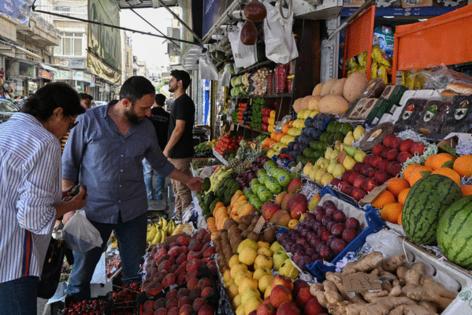Commentary: Sanctions relief is worth a shot for Syria's chance at recovery
Published in Op Eds
During his recent trip to the Middle East, President Donald Trump made the surprise announcement that he would lift sanctions against Syria “in order to give them a chance at greatness.”
This news was received with enthusiasm across the region, since the wide-ranging sanctions make it nearly impossible to attract the investment and aid essential to rebuild after more than a decade of civil war. If the transitional government can’t kick-start the economy, generate revenue, rebuild critical infrastructure and provide jobs for its people, a return to conflict is far more likely — an outcome most of Syria’s neighbors and people would like to avoid.
Syria remains at high risk. Countries emerging from civil war have a 40% chance of returning to conflict soon after. Sanctions relief doesn’t guarantee a stable path ahead, but without it, the country has no real chance of one.
The United States has imposed a comprehensive embargo on Syria since 2011 when Bashar Assad’s regime began a lethal crackdown on public protests, sparking the civil war. An embargo bans nearly all economic interactions with a target state, including trade and financial transactions. The United States had already designated Syria a state sponsor of terrorism in 1979, triggering limitations on aid, arms sales and dual-use exports, as well as some financial transactions, and it levied some sanctions in 2004 as well.
The dominance of the U.S. dollar as the world’s reserve currency and the U.S. economy’s broad reach mean that our sanctions have real bite. They don’t just prevent U.S. businesses from interacting with Syria but also foreign businesses subject to U.S. laws due to presence or activity in the American economy. This means existing U.S. sanctions have had a chilling effect on most businesses considering investing in Syria.
U.S. sanctions relief is a huge win for the new Syrian government and has second-order effects since other Western countries tend to follow America’s lead. The European Union followed suit soon after Trump’s announcement by lifting its sanctions too.
For those who wondered if Trump’s unexpected revelation was a real policy shift or just Trump speaking off the cuff, the U.S. State Department followed with a 180-day sanctions waiver to make it official. This is only a temporary reprieve, though, and the legal framework for the various sanctions remains in place. Risk aversion will continue to deter many businesses until the administration starts the involved task of unwinding relevant laws and designations. But the sanctions waiver is a big step.
This might seem like an obvious policy move, since these provisions were levied against an authoritarian regime that is no longer in place. Why punish a new transitional government for the crimes of the regime it ousted? But this outcome wasn’t inevitable. Sanctions can be a powerful tool, but they are famously hard to change in response to changing circumstances. The legal steps are straightforward, but the domestic politics around these punitive tools are more complex. What if the new government turns out to be just as bad as the old one? Political players are hesitant to give the benefit of the doubt to potentially dangerous groups, and the new government in Syria doesn’t exactly have clean hands.
In December, after years of stalemate in the war, Assad’s long-standing authoritarian regime collapsed, in the face of an unexpected offensive by Hayat Tahrir al-Sham, an Islamist militant group once affiliated with al-Qaida. HTS rapidly made its way across the country from Idlib, taking control of Aleppo and Hama, and then marched into Damascus without a fight. Several other Syrian militant factions joined in the effort. Commanders of the factions named HTS’ leader, Ahmad al-Sharaa, interim president weeks later.
HTS is still a U.S.-designated terrorist group and has a poor human rights record. The $10 million bounty on al-Sharaa’s head was only removed in December. In areas of Syria that HTS recently controlled, it reportedly governed with a harsh version of Islamic law. Al-Sharaa has publicly claimed he will build an inclusive government, “reflecting Syria’s diversity in its men, women and youth,” and that he will protect minorities. But many rights groups are skeptical and think this is little more than a performance for Western countries in order to secure the relief he needs to consolidate his rule.
Perhaps so. Or perhaps he understands now that inclusion is the best path to governing a country such as Syria where different minority groups have proven their willingness to take up arms in the face of oppression.
Al-Sharaa has not earned blind trust from the world, but for the sake of Syria’s beleaguered people, we should give him the chance to succeed. If he proves a bad bet, the United States and others can bring down the economic hammer once again.
_____
Elizabeth Shackelford is senior policy director at Dartmouth College’s Dickey Center for International Understanding and a foreign affairs columnist for the Chicago Tribune. She was previously a U.S. diplomat and is the author of “The Dissent Channel: American Diplomacy in a Dishonest Age.”
_____
©2025 Chicago Tribune. Visit at chicagotribune.com. Distributed by Tribune Content Agency, LLC.

























































Comments